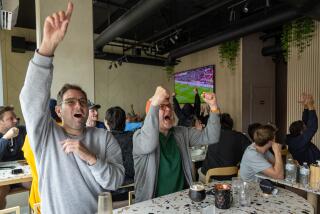S. Korea’s World Cup Fever Comes Down
- Share via
SEOUL — It’s 4 a.m. Do you know where your children, or parents, are?
For South Koreans in the last two weeks, chances are that they were out on the streets with their faces painted, wearing headbands with flickering red lights in the shape of devil horns and uttering mystic chants.
This was not some satanic cult, but crazed fans cheering on their World Cup team. The international soccer tournament turned night to day and pretty much everything else upside down here. Despite a time difference with Germany that led to the matches being broadcast at odd hours of the night, a massive outpouring of South Korea’s population took to the streets to watch and cheer.
Friday’s match against Switzerland was broadcast live at 4 a.m. Saturday in South Korea, where about 1.5 million turned out to watch on huge outdoor screens.
The epicenter for the madness was the plaza in front of Seoul’s City Hall, which was transformed into a sea of tiny red lights that extended anemone-like into the side streets. Police estimated the crowd at 700,000.
Throughout Seoul, buses and subways extended their hours to allow the masses to move. Movie theaters opened their doors after midnight, eschewing Hollywood in favor of soccer. Churches held vigils at 3 a.m. so that fans could pray for God, for country and for the soccer team.
Afterward, of course, they switched on the television.
“Psychologically people want to be together,” said Samuel Lee, a philosopher and secretary-general of the Korean National Commission for UNESCO. “It is not just patriotic. It is self-affirming. People are saying we are part of the globalized world.”
South Korea’s team did not make it into the second round, losing, 2-0, to Switzerland, but surely it was among the winners in fan enthusiasm -- admittedly an intangible that is not ranked by FIFA. According to the English-language Korea Times, about 7 million Koreans living overseas also watched South Korea’s matches at special venues, including thousands who gathered at noon Friday in Los Angeles to watch on large outdoor screens on Wilshire and Olympic boulevards.
“Other countries’ fans cheer for the match and the soccer team, but we are cheering for our country,” said Lee Ki-young, a 31-year-old Seoul vendor of removable tattoos, displaying arms covered with images of Korean flags.
“This is part of being Korean. That’s why I wanted my daughter to be here,” said Jo Young-chin, a 30-year-old woman whose baby was strapped to her back.
From the tops of downtown buildings hung photographs of stars such as national team heartthrob Ahn Jung-hwan. Most people wore red T-shirts, the color of the team’s fan club, known as the Red Devils, but some young women were more adventurous and draped themselves in scanty halter tops fashioned out of Korean flags.
People beeped car horns and trumpets shaped like soccer balls to the rhythm of the national chant, Dae Han Min Guk, or Republic of Korea. Others carried banners reading simply, Corea. (“We like to spell it with a C so it comes ahead of Japan in the alphabet,” explained an architecture student, Lee Hwa-hyun.)
The fans began convening in central Seoul midday Friday and remained until the next morning even as the batteries on their headbands ran out, the red lights fading into the dawn along with the flagging hopes of their team.
When the game finished at 6 a.m., the red-shirted fans were quickly replaced by maintenance men in green uniforms, who whisked away stragglers sitting exhausted on the sidewalks.
Not everybody here will be sorry to see South Korea out of the World Cup. There have been myriad complaints about lost productivity and school truancy. All three of South Korea’s matches fell at night and drew huge turnouts.
The soccer mania was such that it inspired a backlash among some cultural critics, who complained that the over-zealousness of the fans had a whiff of totalitarianism about it.
One blogger posted a photo of Nazi symbols superimposed on the South Korean national flag. (The photo was removed after fans complained.) A Korean website, antisoccer.com, displayed photos of soccer fans urinating on the street and engaging in other antisocial behavior.
“Soccer is all about nationalism and populism, but this is just too much,” said Kim Won, an activist with a group called Civic Action that put anti-World Cup stickers on benches at bus stops and subways.
South Korea’s infatuation with the World Cup took off in 2002 when it and Japan played host to the tournament and the Korean team advanced into the semifinals. But critics say what was a spontaneous fervor four years ago became overly commercialized this time.
Many corporations bought the rights to images of the cheering fans for their advertising.
Advertising at the City Hall plaza was particularly controversial because it was the site of democracy demonstrations in the 1980s.
“It is as though the birthplace of our democracy was bought for cash,” Kim said.
As the fans left City Hall this morning, their eyes heavy with fatigue and dejection over the loss, some too expressed a hint of relief that it was over.
“I’m just looking forward to getting some sleep,” said 14-year-old Kim Yoon-gyung, who, along with her school friends, was scurrying to avoid a fast-moving green-shirted man with a broom.






